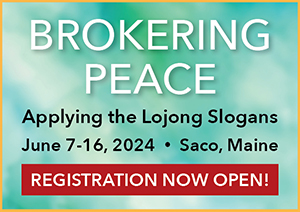The idea of “ego” in buddhadharma is different from the notion of having a healthy ego boundary, which is often associated with a sense of self-confidence, resilience, and inner strength • in Buddhism, the notion of ego refers to a sense of alienation and duality, of making solid or freezing experience • egolessness is very closely connected with non-duality • imagine putting a fence across a vast, snowy field: suddenly there’s a separation between this and that • as soon as there is a quality of duality, all sorts of patterns unfold, many of which cause us pain and suffering • what we think of as a solid thing — ego — is actually a jumble of actions and habitual activities that create the illusion of one solid thing • the teachings of egolessness bring us to the richness and colors of perceptions as they arise moment-by-moment, without overlaying them with some imagined container or holder of those experiences • who owns the experiences we have? we make up an imaginary owner, which in turn makes our experience solid and unworkable • this is ego: the fundamental instigator and perpetuator of suffering
Buddhism – Shambhala – Profound Treasury – Making Friends with Death
